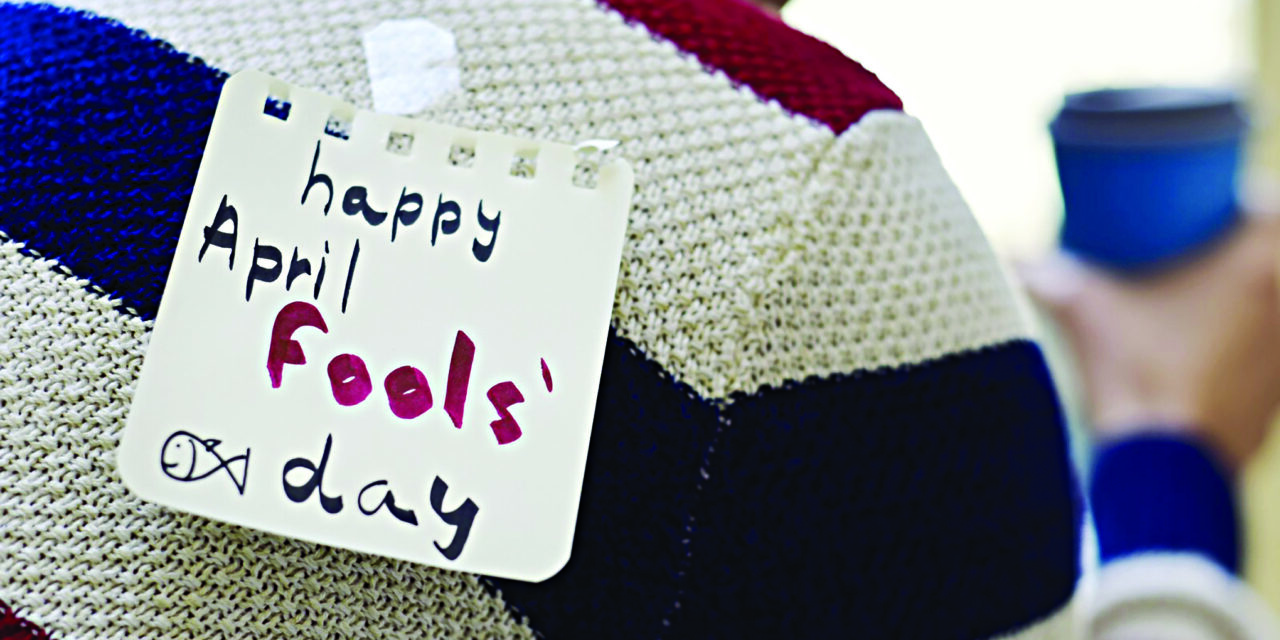By Marie Fricker
On April Fool’s Day, Eileen Charter of Hull, a new Mom, served her two brothers breast milk instead of creamer in their coffee. She secretly dumped her bottle of expressed mother’s milk into a pitcher and the men helped themselves.
“What the heck is this?” said the oldest, spitting his coffee into the sink. “Is it rancid? Did you put sugar in it?”
“Nope, no preservatives added,” said Charter. “It’s breast milk. April Fools, guys!” She laughed as the men gagged and made a swift retreat from her kitchen.
Being the butt of April Fool’s Day jokes is not always fun for the victims but almost invariably for the jokester, who relishes the discomfort of the designated “fools.” This was the case of Marie Gallishaw (yours truly) of Arlington, who was known as Teel Street’s April Fool’s Day queen in 1967.
I pulled a lot of pranks on my friends through the years, and my sister actually didn’t talk to me for a week when I sent her boyfriend home one night when he came to pick her up for a date. As he started to walk up our front steps, I said, “Oh, hi, Bill. Elizabeth’s not here. She left with another guy about an hour ago.” Bill’s face scorched red as he sped off in his yellow Oldsmobile Cutlass.
I tried to yell out, April Fools, I was just kidding, but he never returned. My sister was hysterical when I told her. In a feeble attempt to pay me back, she announced that the principal from my school was coming by to talk to me about my behavior in class. At first, I panicked, but soon realized it was a vengeful April Fools retaliation for my unappreciated prank.
April 1 is known throughout much of the world as the day to play tricks – both minor and major – on unsuspecting individuals in your life. Remember telling your teacher there was chalk on her back and watching her squirm to brush it off? The wake-up slap of “April Fools” quickly releases the fear of a fabricated atrocity, but the victim never fully recovers. The initial shock is just too tough to brush off.
Comedy shows on TV often feature elaborate hoaxes played on celebrities. Late-night host Jimmy Kimmel once engraved the face of his rival, actor Matt Damon, on numerous urinals at a posh L.A. function he was attending.
April Fools lies are meant to scare and even infuriate the victims of the pranks.
What child or adult has not been thwarted by an April Fool’s Day joke involving red hot pepper gum, a whoopie cushion emitting fake gas, a spider in an ice cube, a lump of soft dog poop, plastic vomit, or soap that never lathers? (Can you tell I’ve frequented Don’s Joke Shop in Quincy Center for many years? Like the character of Pee Wee Herman in the movies, I would ask Don what new tricks he had in stock, and he was always thrilled to demonstrate his exploding cigarettes, squirting ketchup bottles and birthday candles that couldn’t be blown out.) Most joke shop gags are harmless in nature, but today’s pranks can cross the line, such as the new fake pregnancy test, which always shows a positive result.
The idea of April Fool’s Day is to trick other people into believing things that are not true. Sometimes the perpetrator goes into elaborate planning before the joke is launched on the first day of April, a practice that has been observed by different cultures for several centuries.
According to Father Martin, a Catholic priest and lover of folklore, the tradition may have its roots in the Greek Orthodox Church, which celebrated a day around Easter as the “Day Jesus laughed.”
“The story was that Jesus exploded from his tomb the next day after his crucifixion to the devil’s shock and dismay,” said Martin. We don’t know if he actually shouted April Fools, but it was a true prank on Lucifer.”
The exact origins of the April 1 holiday are unknown. Some say it began with a Greco-Roman festival on March 25 called the “Hilaria,” where people wore costumes, danced, and played tricks on their companions.
A children’s book by Melissa Rae Shofner posits a number of theories for the tradition’s beginnings. The author warns her young readers, “April Fool’s Day” is celebrated each year on April 1. Be on the lookout for salt in the sugar bowl or a toy spider in your shoe.”
Shofner believes the jokester’s holiday began all the way back in mid-16th century France. “When people in France play tricks on each other, the person who’s fooled is called an ‘April Fish,’” says Shofner. You can often see adults and children wearing paper fish taped to their backs on the first of April.”
A number of other countries have taken up the tradition of April Fool’s Day, including the Hindu “Festival of Colors,” where revelers throw colored powder and play pranks on one another.
Shofner ends her book on April Fool’s Day by reminding her readers of the joyous intent of the holiday. “No joke should ever harm another, she says. “It’s about being silly and having fun.”
This works for young children, but the older ones sometimes stretch the boundaries when setting up a gag. One year in the ’90s, two Norwell teens decided to play an April Fool’s joke on their neighbor who was watching his big TV in the basement alone. One of the boys, Jack F., now a 40-year-old, still laughs hysterically when recounting the prank.
“In those days you could use one remote control to change channels on any TV, even from a distance,” said Jack. So, we waited outside our neighbor’s window until we saw him watching a serious documentary and we switched the channel to an awful horror film. He jumped up and changed the channel back yelling to his wife upstairs. “What the hell is going on? Phyllis, did you do that?”
“We waited till he was back on the couch, eating an orange and engrossed in his program. We switched the channel to the horror show again, and while he tried to change it back, we shut the TV off from the yard and the screen went black. We could hear him bellowing from the basement when we hopped the bushes, and ran home yelling ‘April Fools.’”
These teenagers made it safely home, but many adults have gone too far with the pranks they pull on others, some of which wind up in injuries and even arrests. We’ve all called a stranger with an April Fools trick and then hung up the phone. But what happens when that trick involves fooling with a family member about rescuing you from a car accident or bailing you out of jail?
Twenty-year-old Wayne T. of Framingham loved his older sister, but he also loved practical jokes, particularly on April Fool’s Day. In 1975, he called his sibling Erin and told her he’d been arrested for speeding and didn’t have any money for bail. She offered to come down to the police station with it while Wayne hid across the street to watch the scene.
The officer in charge looked confused as the young woman rushed in. “My brother has been arrested and he’s waiting for this money,” said Erin. “I’m here to pay his bail.”
“I don’t know what you’re talking about Miss,” said the sergeant. “There’s no one in our jail today, and we haven’t made any arrests. Hey, it’s April Fool’s Day, could your brother be pranking you?”
“Oh my God,” she said, suddenly realizing what was happening. She spotted Wayne’s sports car across the street, but before she could reach it, he gunned the gas pedal, laughing wildly.
This kind of practical joke may have been good-natured fun 40 years ago but the prevalence of dangerous scam calls today are on the rise.
“A man once called my 80-year-old mother-in-law Brenda pretending to be a Medicare representative,” said Debra R. of Marshfield. “He said someone had stolen her identity and he needed her social security number and bank account numbers to stop the fraud. Brenda believed the caller’s claims and gave him the information. Fortunately, she called me immediately and I took her to the bank to change all of her accounts. Nothing was stolen but she was afraid to answer the phone for ages.”
Another telephone scam is much more akin to the trick that Wayne T. played on his sister as a harmless April Fool’s joke. The scammer pretends to be a police officer or court official informing an elderly person that her grandchild is in serious trouble through an accident or drunk driving and she needs to wire funds immediately to make bail. Unfortunately, many older people have fallen victim to this fraud for fear of their loved one’s safety.
We live in a different world today when it comes to the practice of prank calling and serious forms of practical jokes. And yet, April Fool’s Day is part of our heritage, and I still love it. As a kid, I made an art of fooling others, but as a senior, I’m content to play the fool with my grandchildren. Just keep it to whoopie cushions and plastic dog poop, kids, but leave out the spiders. They still scare me.
P.S. I’m happy to report that I’ll be receiving a Pulitzer Prize for my second novel, the biography of our esteemed publisher, Thomas W. Foye. — April Fools!




